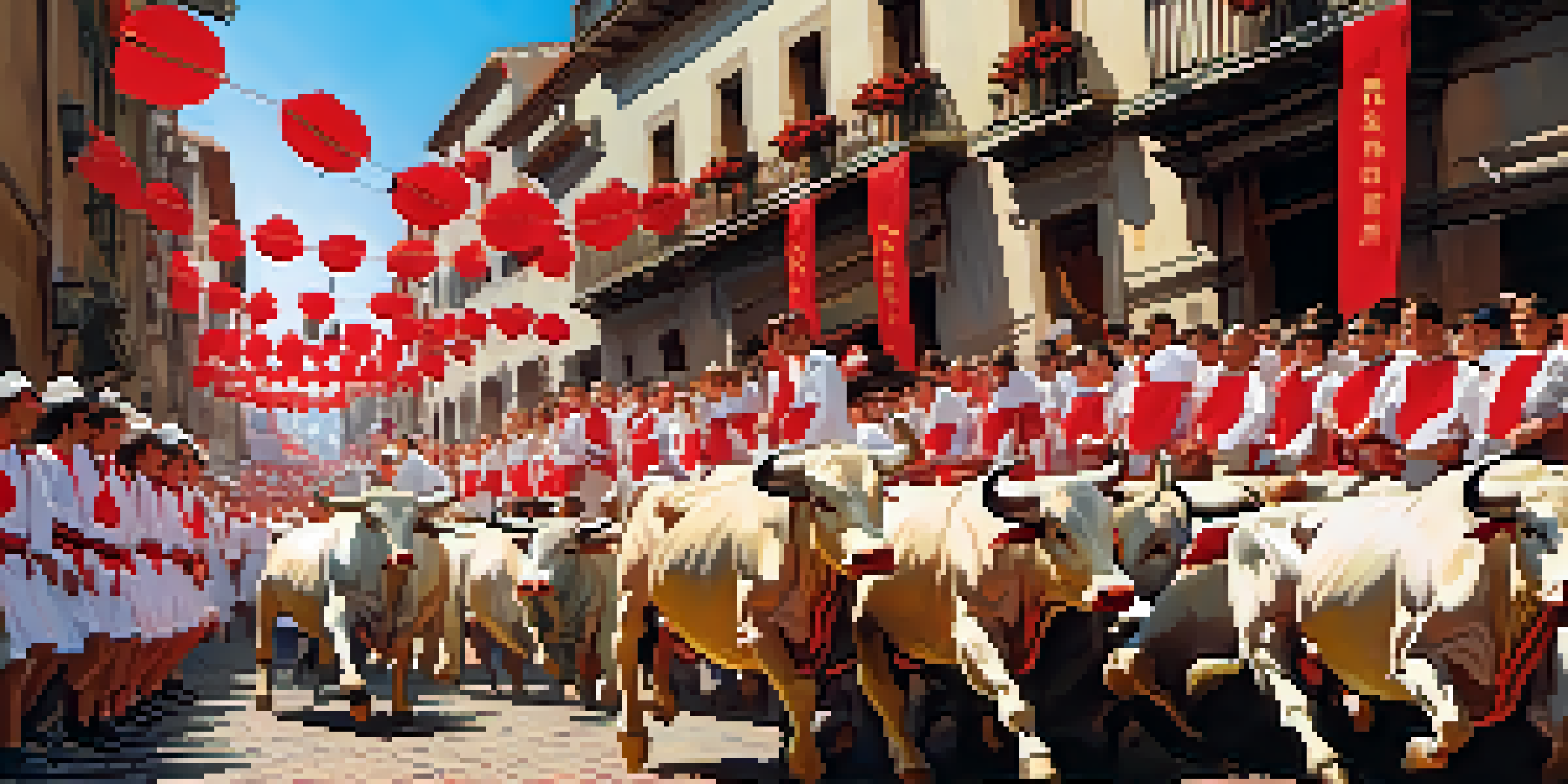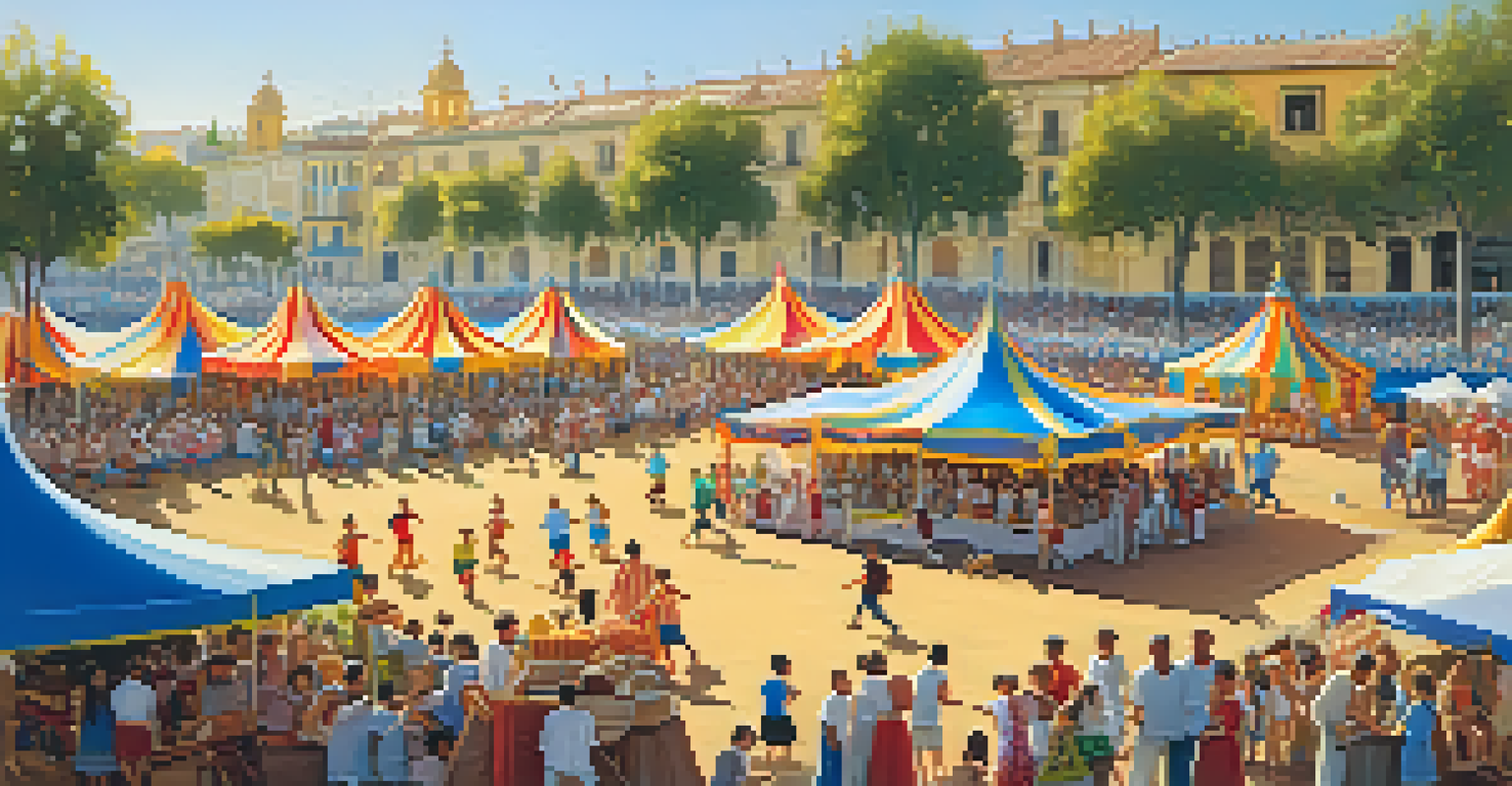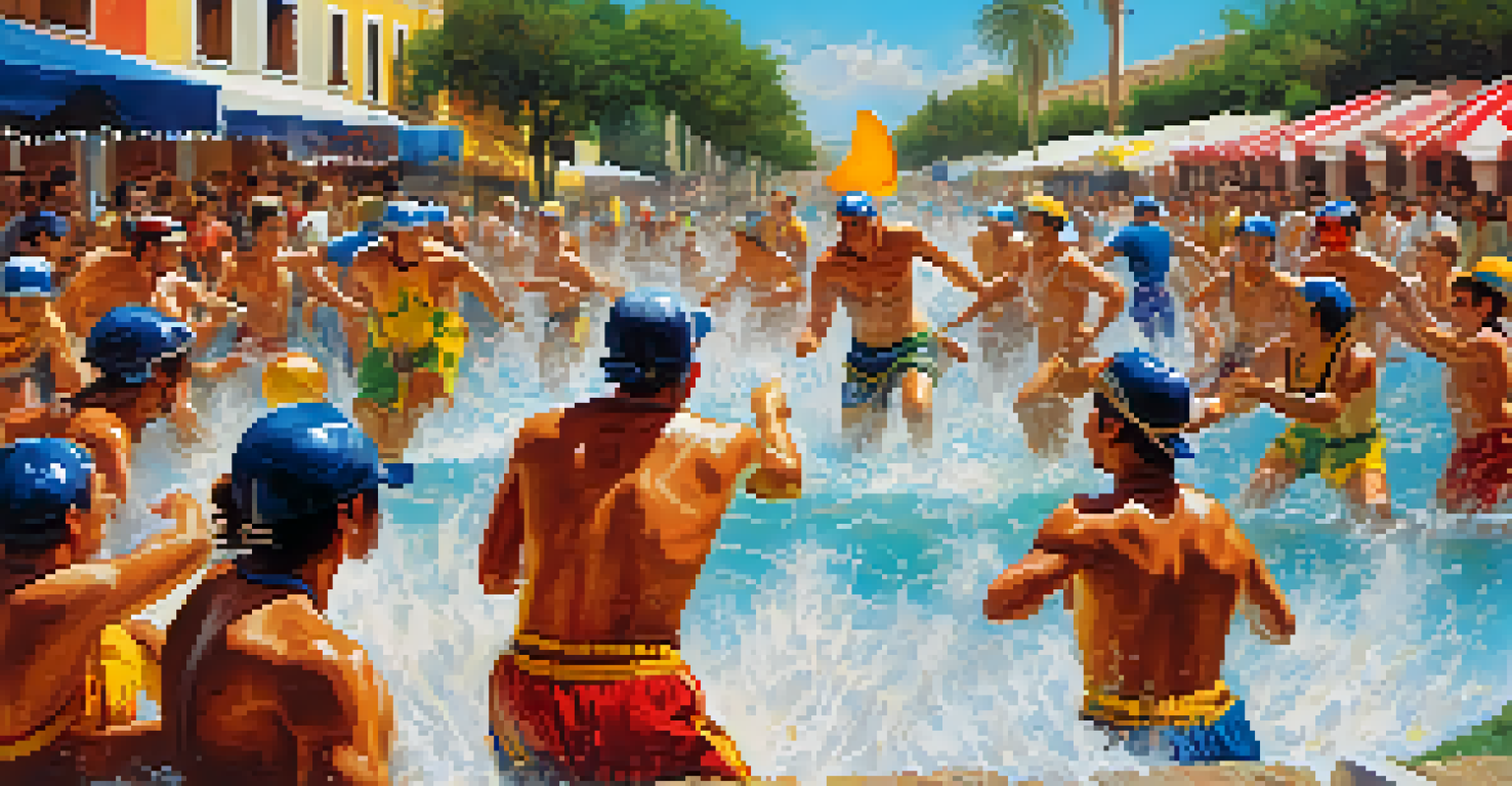The Role of Local Festivals in Promoting Spanish Sports

Understanding the Cultural Significance of Local Festivals
Local festivals in Spain are more than just celebrations; they are vital cultural milestones that bring communities together. These events often showcase traditional sports, highlighting regional pride and fostering a sense of belonging among residents. By participating in or attending these festivals, locals connect with their heritage, reinforcing the importance of cultural identity.
Festivals are about community. They bring people together, and they foster a sense of belonging and pride in one's culture.
Take, for instance, the famous San Fermín festival in Pamplona, where the running of the bulls is a highlight. This event not only attracts tourists from around the world but also allows locals to engage in traditional sports such as pelota and encierro, creating an atmosphere of excitement and camaraderie. Such gatherings provide a platform for showcasing not just sports but also music, dance, and food, enriching the entire community experience.
Ultimately, these festivals act as a celebration of both culture and sport, offering a unique opportunity for locals to participate in their traditions while inviting visitors to appreciate the vibrant Spanish spirit. It's this blend of culture and sport that enhances community ties and fosters pride in local identities.
Local Festivals as Platforms for Sporting Events
One of the most significant roles of local festivals is serving as platforms for various sporting events. From traditional games like 'lucha canaria' in the Canary Islands to competitive cycling events in smaller towns, these festivals provide a stage for athletes of all ages. This encourages participation and showcases local talent, often sparking interest in sports among spectators and participants alike.

For example, the Festa Major de Gràcia in Barcelona includes not only artistic displays but also various sporting competitions like street basketball and soccer. These events not only entertain but also promote physical fitness and teamwork among community members. By integrating sports into these festive occasions, organizers create an inclusive atmosphere that celebrates both competition and collaboration.
Local Festivals Unite Communities
Local festivals in Spain serve as vital cultural milestones that strengthen community ties through shared traditions and sporting events.
Moreover, these festivals often attract sponsors and media attention, further elevating the profile of local sports. This exposure can lead to increased funding for teams and facilities, ultimately benefiting the community’s athletic landscape and encouraging youth involvement in sports.
Enhancing Community Engagement Through Sports
Local festivals provide an excellent opportunity for community engagement, particularly through sports. When residents come together to celebrate, they also participate in friendly competitions that foster camaraderie and teamwork. This interaction strengthens community bonds, making everyone feel more connected and invested in local sports.
Sports do not build character. They reveal it.
During the Feria de Abril in Seville, for example, there are numerous sporting events that encourage participation from all ages. Whether it's a tug-of-war or a relay race, these activities promote inclusivity and joy within the community. Families often come to support their loved ones, creating a spirited environment that enhances collective pride.
As a result, these engagements often lead to the establishment of local sports clubs and programs, ensuring that the enthusiasm generated during festivals translates into ongoing community participation. This cycle of engagement not only strengthens local sports but also cultivates a lasting sense of unity among residents.
Promoting Traditional Sports Through Festivals
Spanish local festivals are perfect venues for promoting traditional sports, which might otherwise fade away in the modern age. Events like the 'Juegos del Agua' in Valencia showcase ancient practices that celebrate regional history and athletic skills. By featuring these sports, festivals educate younger generations and encourage them to take an interest in their local traditions.
For instance, the traditional Basque sport of 'herri kirolak' is often highlighted during local celebrations, bringing together competitors and spectators who appreciate these historical games. This not only preserves the cultural significance of these sports but also inspires a sense of pride among locals, fostering a desire to participate and carry on the legacy.
Sports Boost Local Economies
Festivals that feature sports attract tourism, significantly boosting local economies while promoting cultural exchange.
Thus, by intertwining traditional sports with festive celebrations, these events ensure that cultural practices remain vibrant and relevant. They provide a fun and engaging way to keep history alive, turning spectators into participants and instilling a sense of responsibility to preserve these traditions.
Attracting Tourism Through Sports Festivals
Local festivals featuring sports are a magnet for tourism, bringing in visitors eager to experience the unique cultural offerings of Spain. Many tourists are drawn not just to the festivities but also to the chance to witness or participate in local sports. This influx of visitors can significantly boost local economies and enhance community pride.
Events like the La Tomatina festival in Buñol, which features playful competitions, attract thousands of tourists each year. These festivals provide a unique experience that visitors cannot find elsewhere, making them more likely to return or recommend the destination to others. The visibility generated by these sporting events can also help local businesses flourish, as tourists seek out food, lodging, and souvenirs.
As a result, the integration of sports into local festivals not only enriches the cultural fabric of a community but also ensures a sustainable economic model. By celebrating local sports, towns can develop a reputation that attracts tourists year after year, creating a vibrant cycle of cultural exchange and economic growth.
Fostering Youth Participation in Sports
Local festivals play a crucial role in fostering youth participation in sports by providing platforms for young athletes to showcase their talents. Many festivals include competitions specifically designed for children and teenagers, encouraging them to engage in physical activities while enjoying the festive atmosphere. This early exposure to sports can ignite a lifelong passion.
For instance, during the Festival of San Juan in Alicante, various sporting activities are organized for youth, from soccer tournaments to swimming competitions. Such events not only promote physical fitness but also teach valuable life skills like teamwork, discipline, and perseverance. Young participants often feel a sense of achievement, which can motivate them to pursue sports more seriously.
Youth Engagement in Sports
Local festivals provide opportunities for youth to participate in sports, fostering a passion for athletics and building the next generation of athletes.
By creating an environment where youth can thrive and compete, these festivals help develop the next generation of athletes. This investment in youth sports not only benefits individual participants but also strengthens the overall athletic community, ensuring a bright future for local sports.
Building Lasting Memories and Community Pride
Local festivals centered around sports create lasting memories that strengthen community pride. Participating in or attending these events allows individuals to share unique experiences, fostering a deeper connection to their town and its traditions. The shared joy of celebrating accomplishments, whether big or small, cultivates a sense of belonging.
Consider the emotional impact of watching a local team compete at a festival; the excitement, the cheers, and sometimes the tears of joy or disappointment create moments that bind people together. Celebrating victories as a community fosters pride and unity, while shared challenges build resilience and support networks.

In the end, the memories forged during these festivals ripple through the community, inspiring future generations to participate in sports and keep the spirit of the festival alive. These events become cherished traditions that not only celebrate athletic achievement but also nurture the heart and soul of the community.